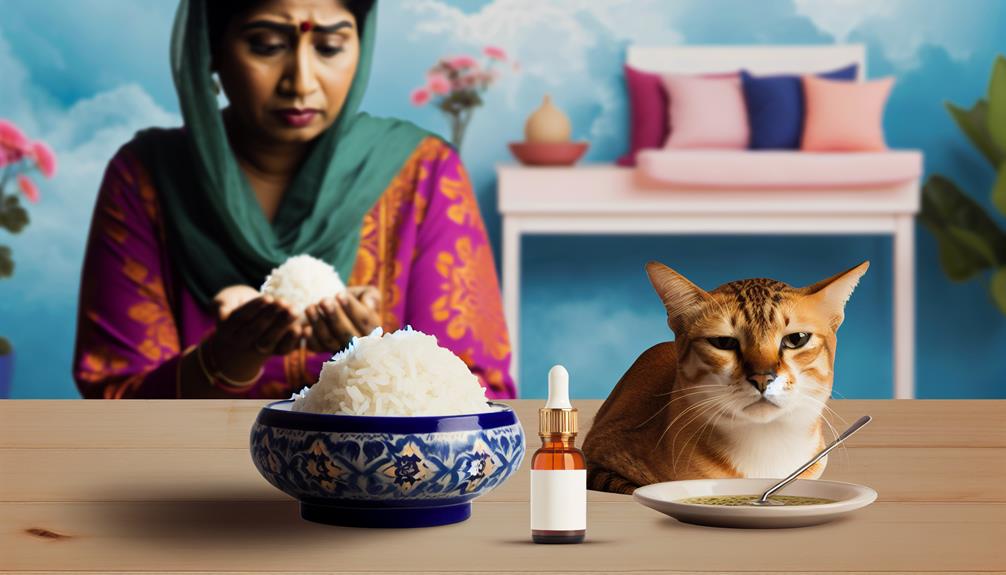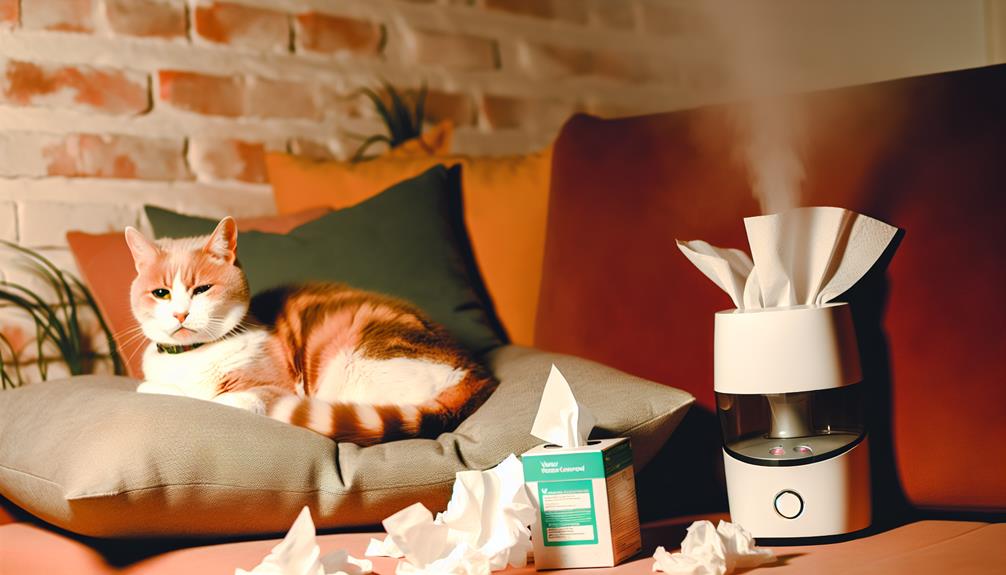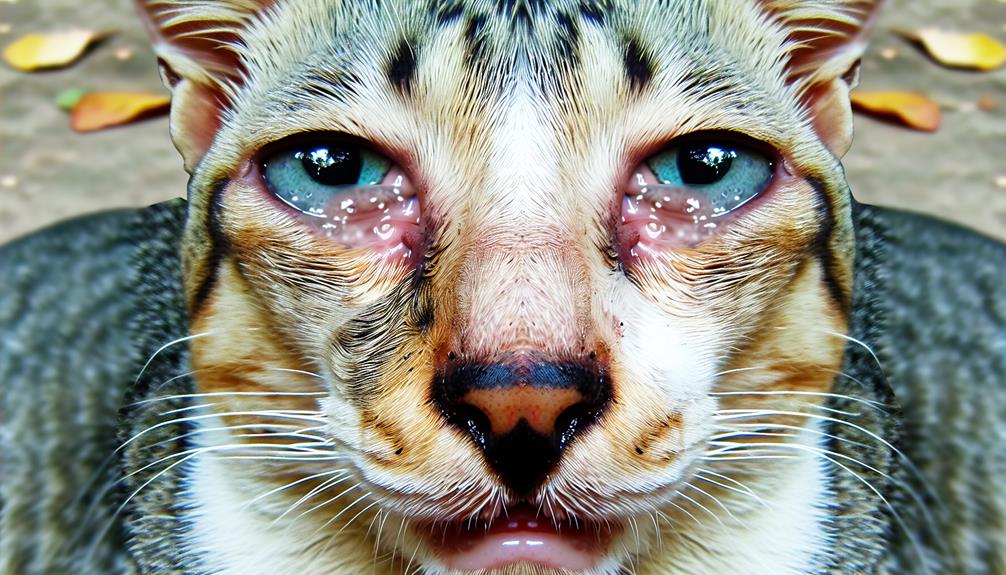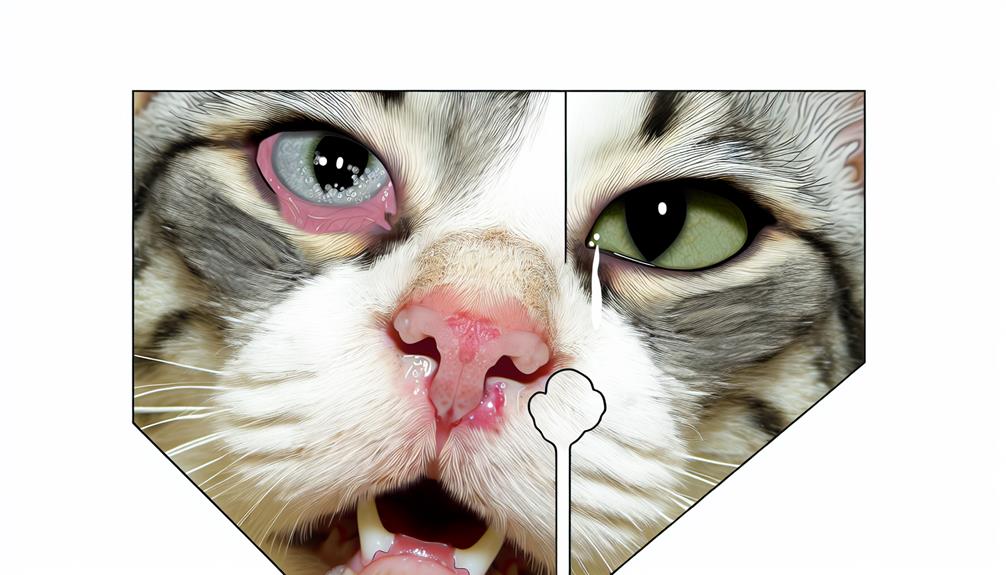Hey there, cat lovers! Have you ever had a feline friend who's suffering from diarrhea? It can be a worrisome situation, but fear not! Today, we're going to explore some home remedies that can help your furry pal feel better. Now, remember, it's important to consult a veterinarian for proper diagnosis and treatment. However, there are a few things you can do at home to ease your cat's discomfort. From adjusting their diet to using natural supplements, these simple remedies might just do the trick. So, let's dive in and discover some safe and effective ways to manage cat diarrhea at home!
Key Takeaways
Key Takeaways:
- Home remedies can be a good first step in treating cat diarrhea, but if the symptoms don't improve, it's important to reach out to a vet for expert advice.
- Feeding your cat a balanced diet and ensuring they stay hydrated can help improve their digestive health and prevent diarrhea.
- It's essential to monitor your cat's symptoms and seek professional help if needed, as a vet can provide a proper diagnosis and treatment plan.
- Home remedies should be used in conjunction with veterinary guidance to ensure the best care for your cat's health.
Causes of Cat Diarrhea
Causes of Cat Diarrhea: What's Making Your Cat's Tummy Upset?
Have you ever wondered why your cat sometimes has diarrhea? Well, there are a few things that can cause it. Let's take a closer look at the reasons behind this messy problem and how you can prevent it.
- Dietary Changes: Just like us, cats can get an upset tummy from sudden changes in their food. It's important to introduce new foods gradually to give their digestive system time to adjust.
- Gastrointestinal Infections: Sometimes, cats can get infections in their tummy that cause diarrhea. These infections can be caused by bacteria, viruses, or parasites. If your cat has diarrhea that lasts for more than a day or two, it's important to see a vet.
- Underlying Health Conditions: In some cases, diarrhea can be a symptom of an underlying health condition. This could be something like inflammatory bowel disease or food allergies. A vet can help diagnose and treat these conditions.
Now that we know some of the causes, let's talk about how to treat and prevent cat diarrhea.
- Treatments: If your cat's diarrhea is caused by a dietary change, you can try feeding them a bland diet of boiled chicken and rice. This can help soothe their tummy. Probiotics can also be helpful in restoring a healthy balance of bacteria in their gut. For infections, it's important to see a vet who can prescribe the right medication.
- Prevention: To prevent cat diarrhea, it's important to provide your cat with a stable and balanced diet. Avoid sudden changes in their food and make sure they always have fresh water available. This will help keep their digestive system happy and healthy.
Symptoms to Watch for
Is Your Cat's Poop a Problem? Look Out for These Signs!
Hey there, cat lovers! Have you ever wondered what your furry friend's poop can tell you about their health? Well, get ready to learn some important clues!
Sometimes, our kitties can get a case of the runs. But did you know that diarrhea in cats can be caused by lots of different things? It could be a change in their diet, an allergy, an infection, pesky parasites, stress, or even a medical condition. Knowing the symptoms can help you figure out what's going on and how to help your kitty feel better.
So, what should you look for? Well, one of the most obvious signs is when your cat's poop is loose, watery, or happens more often than usual. Yuck! You might also see blood or slimy mucus in their stool. Ouch! Your cat might have trouble pooping and seem uncomfortable or in pain. Poor thing! And keep an eye out for changes in their appetite or weight loss. That's not good!
In really bad cases, your cat might seem tired all the time, get dehydrated, throw up, or even have a fever. Yikes! If you notice any of these signs, it's super important to talk to a vet. They'll do a thorough checkup and run some tests to figure out what's causing the diarrhea. Then, they can recommend the right treatment for your furry friend.
Now, the treatment will depend on what's causing the problem. It might mean changing their diet, giving them some medicine, or even special probiotics. And if they're really dehydrated, they might need some fluids to get them back on track.
So remember, if your cat's poop is not looking normal, don't ignore it! Keep an eye out for those signs and get in touch with a vet. They'll help you figure out what's going on and get your kitty feeling better in no time.
Stay curious and take care of your furry friends!
Home Remedies to Try
What Can You Do to Help Your Cat's Diarrhea?
Is your furry friend suffering from an upset tummy? Don't worry, there are some simple and natural remedies you can try at home to help your cat feel better. Let's take a look:
- Pumpkin Power: Did you know that pumpkin puree can work wonders for cat diarrhea? It's true! Just add a teaspoon of plain, canned pumpkin to your cat's food. Pumpkin is packed with fiber and can help regulate their digestive system, making their stool firmer.
- Soothing Slippery Elm Bark: Another fantastic natural remedy is slippery elm bark. This herb has special properties that can reduce inflammation in your cat's tummy. Mix a small amount of slippery elm bark powder with water and give it to your cat. They'll find relief from their diarrhea in no time.
- Probiotic Superheroes: Probiotic supplements can be superheroes for your cat's digestive health. These supplements contain good bacteria that can restore the balance in their gut. When the gut flora is out of whack, it can cause diarrhea. Give your cat a probiotic supplement made just for them, and watch their digestive health improve.
Remember, while these home remedies can be helpful, they are not a substitute for proper veterinary care. If your cat's diarrhea persists or gets worse, it's important to consult with a veterinarian for the right diagnosis and treatment.
Keep your furry friend happy and healthy with these natural remedies for cat diarrhea!
Diet and Hydration Tips
Are you worried about your cat's diarrhea? Don't fret! We've got some helpful tips to take care of your furry friend's diet and hydration. Check them out:
1. Probiotic supplements****: Did you know that good bacteria can help your cat's tummy? Probiotic supplements are like superheroes for your cat's gut. They restore balance and improve digestion. Look for probiotic supplements made specifically for cats at your local pet store or ask your vet for recommendations.
2. Electrolyte solutions****: When your cat has diarrhea, they can get dehydrated. That's not good! Keep them hydrated by giving them special electrolyte solutions made just for cats. These solutions have essential minerals and fluids to make sure your cat stays healthy. You can find them at the pet store or ask your vet for advice.
3. Moist food****: Want to keep your cat hydrated and give them yummy food? Try feeding them moist food! It's like a double win. Wet food has lots of water and is easy to digest. Look for high-quality wet food that contains good ingredients. This will help your cat recover faster and get all the nutrients they need.
4. Small, frequent meals****: Instead of giving your cat big meals, try smaller, more frequent ones. This helps their digestion and makes it easier for them to absorb nutrients. Plus, it reduces the chances of overeating and making the diarrhea worse. So, go for smaller meals throughout the day.
When to Seek Veterinary Care
When Should You Take Your Cat to the Vet for Diarrhea?
Has your cat been experiencing diarrhea? It's important to know when it's time to seek veterinary care. Here are some signs that indicate you should take your cat to the vet:
- Diarrhea that lasts for more than 24 hours: If your cat's diarrhea persists for more than a day, it's a good idea to seek professional help.
- Bloody or black stools: If you notice blood or a dark color in your cat's stools, it's a serious sign that requires immediate veterinary attention.
- Severe abdominal pain or discomfort: If your cat seems to be in a lot of pain or discomfort, it's best to have them checked by a vet.
- Lethargy: If your cat is unusually tired, weak, or lacking energy, it could be a sign that something more serious is going on.
- Dehydration: If your cat is not drinking enough water and shows signs of dehydration (such as dry gums, sunken eyes, or excessive panting), it's important to get them to a vet as soon as possible.
- Loss of appetite: A sudden loss of appetite can be a sign of an underlying issue that needs medical attention.
Remember, early intervention is crucial when it comes to cat diarrhea. If left untreated, the underlying cause of the diarrhea could lead to further complications. A veterinarian will be able to properly diagnose the cause and recommend appropriate treatment options, such as medication, dietary changes, or additional tests.
Frequently Asked Questions
Can Stress or Anxiety Cause Cat Diarrhea?
Frequently Asked Questions:
Q: Can stress or anxiety cause cat diarrhea?
A: Yes, stress or anxiety can indeed cause diarrhea in cats. Changes in their environment, feeling anxious when separated from their owners, or even certain medical conditions can all contribute to stress-induced diarrhea. To help prevent this, it's important to create a stable routine for your cat, provide them with a stimulating environment, and consider behavioral therapy if needed.
Q: How can I help my stressed-out cat?
A: There are several ways you can help your stressed-out cat. Firstly, establish a consistent routine for them so they know what to expect each day. Additionally, make sure they have plenty of toys, scratching posts, and hiding spots to keep them mentally engaged. If your cat's stress persists, consider consulting with a veterinarian who may recommend behavioral therapy or other interventions.
Q: What are some signs of cat anxiety?
A: Cats can show signs of anxiety in various ways. Look out for excessive grooming, hiding more often, increased aggression, or changes in appetite and litter box habits. They may also become more vocal, restless, or avoid social interactions. If you notice any of these signs, it's important to address your cat's anxiety and provide them with the support they need.
Q: Can stress diarrhea in cats be treated?
A: Yes, stress diarrhea in cats can be treated. The first step is to identify and address the underlying source of stress. Once that is done, your veterinarian may recommend changes to your cat's diet or prescribe medication to help manage their symptoms. It's important to work closely with your vet to develop a treatment plan that is tailored to your cat's specific needs.
Q: How long does stress diarrhea in cats usually last?
A: The duration of stress diarrhea in cats can vary depending on the individual and the underlying cause. In some cases, it may resolve within a few days once the stressor is removed or managed. However, if the stressor persists or the diarrhea continues for more than a few days, it's important to consult with a veterinarian for further evaluation and treatment.
Are There Any Over-The-Counter Medications That Can Be Used to Treat Cat Diarrhea?
Frequently Asked Questions:
Q: Can I give my cat over-the-counter medications for diarrhea?
A: It's important to talk to a vet before giving any medications to your cat. They can recommend the right treatment based on the cause of the diarrhea.
Q: Are there natural remedies for cat diarrhea?
A: Yes, there are! Probiotics, which are like good bacteria, can help restore balance in your cat's digestive system. Feeding them a bland diet of cooked chicken and rice can also help soothe their tummy.
Q: Why is it important to consult a vet?
A: Vets are experts in understanding your cat's health. They can determine the cause of the diarrhea and recommend the best treatment. Plus, they can make sure the medication won't interfere with any other health conditions your cat may have.
Q: What are some common causes of cat diarrhea?
A: There are many things that can cause diarrhea in cats, like eating something they shouldn't, infections, or even stress. It's important to figure out the cause so the right treatment can be given.
Q: Can I give my cat human diarrhea medicine?
A: No, it's not safe to give your cat human medicine without a vet's guidance. Cats are different from humans and some medications can be toxic to them.
Should I Change My Cat's Diet if They Have Diarrhea?
Frequently Asked Questions:
Q: Why should I change my cat's diet if they have diarrhea?
A: When a cat has diarrhea, changing their diet can help their digestive system get better. It can make their tummy feel better and help them poop normally again.
Q: What kind of diet should I give my cat with diarrhea?
A: It's best to give your cat a special diet that is easy to digest. This means giving them food that is gentle on their tummy, like boiled chicken or rice. It can help their poop become more solid and reduce diarrhea.
Q: How do I change my cat's diet?
A: If you want to change your cat's diet, it's important to do it slowly. Start by mixing a small amount of the new food with their old food. Then, gradually increase the amount of new food while decreasing the old food. This helps their tummy adjust to the new diet without upsetting it.
Q: Can I give my cat any treats while they have diarrhea?
A: It's best to avoid giving your cat treats when they have diarrhea. Treats can sometimes be too rich or hard to digest, which can make the diarrhea worse. Stick to their regular diet and give them lots of fresh water to drink.
Q: How long should I wait to see if the diet change is helping?
A: It may take a few days for the diet change to start helping your cat's diarrhea. If you don't see any improvement after a few days, it's a good idea to talk to a veterinarian. They can give you more advice and make sure there isn't another reason for the diarrhea.
Can Cat Diarrhea Be a Sign of a More Serious Underlying Health Issue?
Frequently Asked Questions about Cat Diarrhea:
Q: Can cat diarrhea be a sign of something more serious?
A: Yes, cat diarrhea can sometimes be a sign of underlying health issues. It could be caused by infections, parasites, or problems with their diet. It's important to talk to a vet to figure out what's going on and find the right treatment for your cat.
Q: What should I do if my cat has diarrhea?
A: If your cat has diarrhea, it's a good idea to take them to the vet. The vet can examine your cat and run tests to figure out what might be causing the diarrhea. They can then recommend the best treatment to help your cat feel better.
Q: Can I give my cat any over-the-counter medicine for diarrhea?
A: It's not a good idea to give your cat over-the-counter medicine without talking to a vet first. Some medicines that are safe for humans can be harmful to cats. It's always best to get advice from a professional who knows about cat health.
Q: Is there anything I can do at home to help my cat with diarrhea?
A: While it's important to see a vet for proper treatment, there are a few things you can do at home to help your cat feel better. Make sure they have plenty of fresh water to stay hydrated, and try feeding them a bland diet of boiled chicken or plain rice. But remember, it's still important to consult with a vet.
Q: Can I prevent my cat from getting diarrhea?
A: While you can't prevent all cases of cat diarrhea, there are some things you can do to reduce the risk. Make sure your cat is up to date on their vaccinations and deworming. Feed them high-quality cat food and avoid sudden changes in their diet. Keep their litter box clean, and try to minimize their exposure to other sick animals.
Q: Is cat diarrhea contagious to humans?
A: Most cases of cat diarrhea are not contagious to humans. However, some types of infections or parasites that can cause diarrhea in cats can also affect humans. It's always a good idea to practice good hygiene, like washing your hands after handling your cat or cleaning the litter box, just to be safe.
Q: How long does cat diarrhea usually last?
A: The duration of cat diarrhea can vary depending on the cause. In some cases, it may only last a day or two. But if it continues for more than a few days or if your cat seems sick or in pain, it's important to see a vet. They can help determine the cause and provide appropriate treatment.
How Long Does It Usually Take for Home Remedies to Work in Treating Cat Diarrhea?
Frequently Asked Questions:
Q: How long does it take for home remedies to work on cat diarrhea?
A: Usually, home remedies for cat diarrhea can start working within a few days. However, the time it takes to see improvement may vary depending on what's causing the diarrhea.
Q: How can I treat my cat's diarrhea naturally?
A: There are a few things you can do to help treat your cat's diarrhea naturally. Make sure your cat is eating a balanced diet and staying hydrated. You can also try feeding them small, frequent meals of easily digestible food like boiled chicken or rice. Additionally, giving them probiotics can help restore the good bacteria in their gut.
Q: Can I prevent cat diarrhea?
A: Yes, you can take steps to prevent cat diarrhea. Feeding your cat a healthy, balanced diet and making sure they always have access to fresh water can help. Avoid sudden changes in their diet, and be cautious about giving them human food or treats that may upset their stomach. Regular vet check-ups and vaccinations can also help prevent certain infections that can cause diarrhea.
Q: When should I take my cat to the vet for diarrhea?
A: If your cat's diarrhea persists for more than a couple of days, if there is blood in their stool, or if they show other concerning symptoms like vomiting, lethargy, or loss of appetite, it's best to take them to the vet. The vet can determine the underlying cause of the diarrhea and provide appropriate treatment.
Q: Are there any over-the-counter remedies for cat diarrhea?
A: Over-the-counter remedies for cat diarrhea are not recommended without consulting a veterinarian first. Some medications may be harmful to cats or may not be effective for their specific condition. It's always best to seek professional advice before giving any medications to your cat.
Conclusion
To sum it up, home remedies can be a great way to start tackling cat diarrhea. Keep an eye on your cat's symptoms and if things don't improve, reach out to a vet. Feeding your furry friend a balanced diet and making sure they stay hydrated can also help. Remember, a vet is the best person to give a proper diagnosis and treatment plan. Don't hesitate to ask for their expert advice. Now, what are your thoughts on home remedies for cat diarrhea? Share them with us or explore more about this topic!




